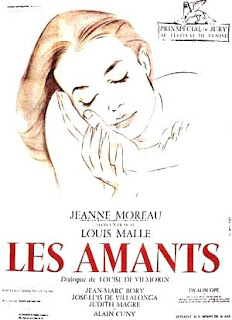The Lovers
After the death of Jeanne Moreau last summer I had been meaning to get to this film, The Lovers, Louis Malle's second feature. Made in 1958, it is perhaps best known for being the subject of a U.S. obscenity case that went all the way to the Supreme Court, and to which Justice Potter Stewart said of obscenity, "I know it when I see it." He did not think The Lovers was obscene.
Today's audiences wouldn't think so, either. I thought it a bit of a bore, and the sight of two strategically draped naked people would be mild stuff for most (Moreau's nipple does make a cameo).
Moreau is a provincial woman who is married to a stiff, the editor of the local newspaper (they live in Dijon, and I kept thinking of mustard). Moreau takes off for Paris every chance she can get, supposedly to visit her friend, who is one of those women who doesn't have an original thought in her head and is concerned only with the latest fashions. But Moreau's real reason for going is to visit her lover, Raoul, dashing Spanish polo player. This is all implied, as Moreau and Raoul are never seen doing more than him kissing her hand.
Moreau's husband is so tired of hearing about them that he insists Moreau invite them both to their house for dinner. She knows this is going to be awkward, but can't refuse. On the way there her car breaks down and she's given a lift by a terse young man (Jean-Marc Bory). Because of his kindness, and because everyone knows one of his relatives, he's invited to dine and stay overnight.
The movie then takes an unbelievable turn. Moreau is out walking in the moonlight, having practically pushed Raoul out of her room (she and the mister have separate bedrooms). She bumps into Bory, and they exchange sarcastic remarks. Then, as if one screenwriter were hit over the head and replaced by another one, Moreau and Bory start exchanging words of romance. They take a boat ride, and then tumble into bed. The following morning they take off together, leaving her husband and lover aghast.
I didn't buy it, although the voiceover narration indicated that Moreau already had her doubts, but with no regrets. But I don't like films that have two characters showing no chemistry at all suddenly swooning, only because the script tells them they must.
Malle, for his part, does what a 26-year-old director should do when he has Jeanne Moreau--he uses her face. There are many closeups of her, including many key-lit shots in darkness that make her look ghostly. When you've got it, or her, flaunt it. Otherwise this is a pretty dull movie, the kind that was sensational 50 years ago but is now just ordinary.
Today's audiences wouldn't think so, either. I thought it a bit of a bore, and the sight of two strategically draped naked people would be mild stuff for most (Moreau's nipple does make a cameo).
Moreau is a provincial woman who is married to a stiff, the editor of the local newspaper (they live in Dijon, and I kept thinking of mustard). Moreau takes off for Paris every chance she can get, supposedly to visit her friend, who is one of those women who doesn't have an original thought in her head and is concerned only with the latest fashions. But Moreau's real reason for going is to visit her lover, Raoul, dashing Spanish polo player. This is all implied, as Moreau and Raoul are never seen doing more than him kissing her hand.
Moreau's husband is so tired of hearing about them that he insists Moreau invite them both to their house for dinner. She knows this is going to be awkward, but can't refuse. On the way there her car breaks down and she's given a lift by a terse young man (Jean-Marc Bory). Because of his kindness, and because everyone knows one of his relatives, he's invited to dine and stay overnight.
The movie then takes an unbelievable turn. Moreau is out walking in the moonlight, having practically pushed Raoul out of her room (she and the mister have separate bedrooms). She bumps into Bory, and they exchange sarcastic remarks. Then, as if one screenwriter were hit over the head and replaced by another one, Moreau and Bory start exchanging words of romance. They take a boat ride, and then tumble into bed. The following morning they take off together, leaving her husband and lover aghast.
I didn't buy it, although the voiceover narration indicated that Moreau already had her doubts, but with no regrets. But I don't like films that have two characters showing no chemistry at all suddenly swooning, only because the script tells them they must.
Malle, for his part, does what a 26-year-old director should do when he has Jeanne Moreau--he uses her face. There are many closeups of her, including many key-lit shots in darkness that make her look ghostly. When you've got it, or her, flaunt it. Otherwise this is a pretty dull movie, the kind that was sensational 50 years ago but is now just ordinary.



Comments
Post a Comment